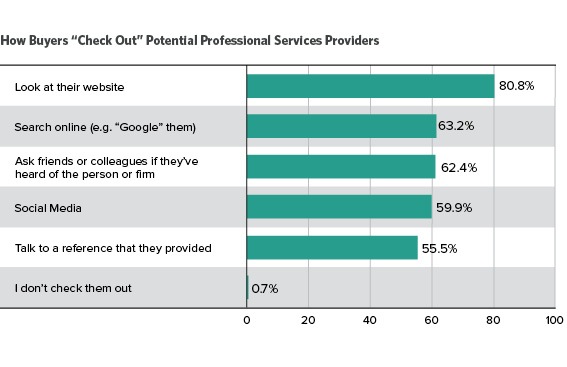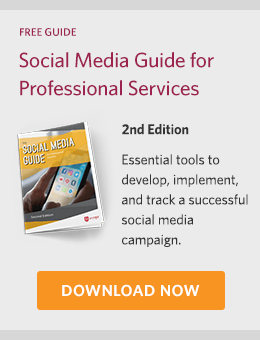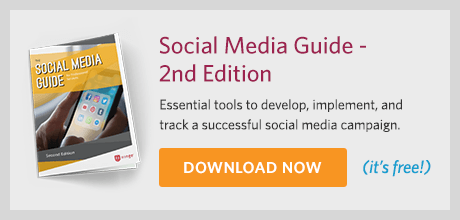The Top 10 Benefits of Using Social Media Marketing for Business

Many professional services firms – even those that have embraced many facets of online marketing – are still wary of social media. These firms might have limited or nonexistent presences on major social media platforms, or they haven’t taken steps to integrate social media into their larger marketing strategies.
Does this sound like your firm? If so, you’re not alone. But social media isn’t a flash in the pan – it’s a key ingredient in your larger online marketing recipe, helping other online marketing techniques work as effectively as possible while boosting your firm’s reputation and visibility. Social media isn’t a fad, it’s not going away, and firms that fail to take advantage of it will fall behind the competition.
Why is social media so important? Below, we’ve collected the top ten benefits of using social media marketing for business.
1) Social media is the online version of networking.
If you’re trying to wrap your head around what exactly social media is (or what role it might play for your business) you can think of it as a tool for taking traditional networking to the online realm.
Make no mistake, traditional networking through trade shows, conferences, and other events is still important. But the rise of social media has created a new way to connect with other professionals and influential figures in your industry. When used successfully, networking through social media can achieve many of the same business goals as in-person networking – but without the restrictions of schedule, geography, or expensive travel arrangements.
By finding the social media hubs where your clients and prospects congregate, you can connect efficiently with your target audiences on a more personal level and carry on real-time (or near-real-time) conversations. In the professional services world, LinkedIn Groups are one of the most common places to find social media communities and conversations around your industry.
2) Buyers are turning to social media to check out firms before purchasing.
Across the professional services industries, we’ve seen a paradigm shift in the way buyers learn about potential service providers. Buyers have turned decisively toward online sources of information, including social media. Our recent research on 1,028 professional services buyers makes the trend clear:

About 60% of today’s buyers check out professional services providers on social media – and social media has eclipsed formal references as a source of information.
The numbers are clear: prospective buyers are on social media. And more and more providers are there too. In order to remain competitive, it’s important to go where your buyers are looking. In this case, that means social media.
3) Social media helps you develop your reputation as a Visible Expert®.
High-visibility experts are changing the way professional services firms go to market, leveraging their personal brands to boost the reputation and visibility of their firms. Our most recent research has shown that these industry leaders deliver a wide range of benefits to their firms, spurring growth, business development, and brand building while raising billing rates and lead generation.
With the power of Visible Experts made plain, the question becomes: How can you grow your own reputation as a Visible Expert, or develop high-visibility experts within your firm? Our research found that social media was a key marketing tool used by Visible Experts to build their personal brands:
- 92% use LinkedIn
- 76% use Facebook
- 74% use Twitter
- 54% use Google+
LinkedIn is actually the top tool used by Visible Experts, including both online and offline techniques. That’s not surprising: today, social media (and LinkedIn in particular) is essential to building visibility in the marketplace.
4) Social media helps your firm monitor its brand awareness.
Social media isn’t just a platform for connection – it’s also a valuable tool for gathering data. Specifically, social media can offer a powerful way to track your brand awareness online.
This monitoring capability takes a number of different forms. You can track conversation about your firm to see what others are saying about you, and how those sentiments change over time. Social “listening” tools can simplify this process, alerting you to mentions of your firm and even allowing you to compare your own social profile to that of your competitors.
You can also evaluate the effectiveness of the content you’re sharing by analyzing the frequency with which people share or respond to it. Similarly, you can track the expansion of your reach online by your number of followers, fans, and contacts.
5) Social media can help you deliver your content to a wide audience.
Social media is an easy and cheap way to promote your firm’s educational content to a large audience. You might link to a webinar on Twitter or share a tutorial blog post on LinkedIn. LinkedIn Groups are a particularly effective way to connect the right audience with the right piece of content, connecting a target industry with information that is relevant to them.
This is an important role that social media plays in a wider content marketing strategy – helping to get the word out. Social media is one vehicle by which new audiences may arrive at your content. If you create something that really helps people in your target audience, they’ll share it with their own friends and colleagues – and help attract new visitors to your content.
However, make sure to balance self-promotion (“Read our new blog post!”) with promotion of others – sharing relevant and educational content from other industry players. On social media (particularly on Twitter), you should observe what is called the “80/20 rule”: 80% of your activity is engagement with others’ content, and 20% is promoting your own content.
6) Social media drives traffic to your firm’s website – and helps increase conversions.

This point builds on the last. Social media can be a significant source of traffic to a firm’s website. Sometimes, new visitors will discover you through your content promotion. Sometimes, they will notice that you are participating in industry conversations – perhaps on a LinkedIn Group or industry Twitter hashtag.
Many of these visitors will already have a sense of you as a firm, based on what they’ve learned on social media about how you think and what you have to say. (Remember how buyers check you out on social media?) This is one reason why traffic from social media can help boost conversions and grow your email list. Social media gives your audience a way to get to know you and then access the rest of your online presence.
7) Social media influences SEO.
It’s likely that social media can actually impact your firm’s rankings in online search results in a variety of ways. Although social media isn’t a known factor in Google’s algorithm, the consensus is that social media contributes to rankings by way of “link potential.”
By sharing your content with a wide audience through social media, you create more opportunities for people in your industry to link to and engage with your content. Links and engagement are two factors that contribute to your site’s visibility in search – social media helps give these and other factors a boost by connecting more people with your content and signaling to Google that your content is relevant.
8) Social media can be used to conduct research.
Social media gives you a wealth of data on your competitors, prospects, potential partners, job candidates, industry trends, and more. That makes it a great platform for marketplace research.
SEE ALSO: What Every Managing Partner Needs to Know About Social Media
You can check out profiles of both individual professionals and other firms to get a better understanding for their particular expertise, reputation, visibility, reach, and personality. This is a valuable resource when assessing the competition or evaluating potential business opportunities.
To keep up with industry news, you can see what’s trending on social media, follow major influencers in your industry, and keep up with relevant LinkedIn Groups or hashtags. Today, these are the places where many major industry conversations start.
9) Social media showcases your firm’s culture.
Social media gives clients, prospects, professional partners, and potential job candidates a picture of your firm’s culture – through the tone you use, the topics you discuss, and the ways you interact with others in your industry. This is an important way that today’s professionals “get to know” a firm: social media is an opportunity to project who you are what makes you unique.
There are a number of ways to share your culture on social media. You can share video, pictures, and other multimedia to introduce audiences to your team in a more personal, “face-to-face” way. Facebook and Twitter are good avenues for a slightly more relaxed picture of life at your firm – you can show audiences what it’s like “behind the scenes,” highlighting firm social events or professional development activities.
10) Social media can be a useful recruiting tool.
It’s not hard to imagine how sharing your culture might help attract job candidates to your firm. But social media can also help you vet candidates. LinkedIn is particularly useful in this regard, with a Jobs section where your firm can post job openings to reach the right candidates. LinkedIn also gives you a useful way to see recommendations from an individual’s past colleagues and contacts, as well as endorsements of their various skills and a timeline of their work.
Conclusion
Social media is so much more than a megaphone for your message – though it is certainly that, as well. Used effectively, social media can be a platform for gathering key data, bringing in better job candidates, and optimizing your content marketing program. As buyers and other industry audiences increasingly look to social media for information about firms, it grows increasingly vital that professional services providers adopt social media and integrate it closely into their online marketing efforts.
For more insights on social media for professional services firms, check out our free Social Media Guide.
On Twitter or LinkedIn? Follow us @hingemarketing and join us on LinkedIn.

Industries & Topics
Most Popular
- Business Development Strategy: A High-Growth Approach
- A 10 Step Brand Development Strategy for Your Professional Services Firm
- Strategic Marketing for Professional Services
- Digital Branding for Professional Services
- 10 Essential B2B Marketing Strategies to Grow Your Professional Services Firm
- Digital Marketing Strategy for Professional Services
- Rebranding Strategies: A Step-By-Step Approach for Professional Services
- Elements of a Successful Brand 1: Brand Positioning
- The Top 5 Business Challenges for Accounting & Financial Services Firms
- Find Your Differentiator: 21 Ways to Gain a Competitive Advantage for Your Firm
- Elements of a Successful Brand 4: Brand Promise
- What Is the Cost of Video Production for the Web?





Leave a Comment